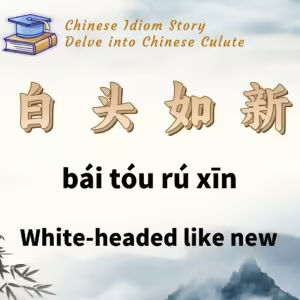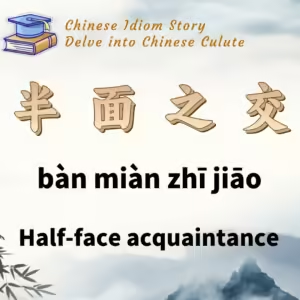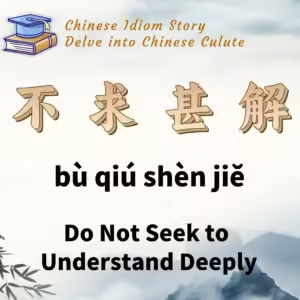
Chinese Idiom: 白头如新 (Bai Tou Ru Xin)
English Translation: White-headed like new
pīn yīn: bái tóu rú xīn
Idiom Meaning: This idiom originally meant that if friends do not understand each other deeply, even after years of knowing each other, they would still be like strangers. It later came to describe relationships where familiarity does not lead to true understanding or closeness. “白头” (bái tóu) refers to white hair, symbolizing old age, while “新” (xīn) means new, referring to a new acquaintance.
Historical Source: The Letter to King Liang (《狱中上梁王书》)
Idiom Story:
Zou Yang, a native of Qi during the Western Han dynasty, was known for his eloquence and intelligence. In his early years, he served under Wu Wang, but after Wu Wang’s rebellion, Zou Yang advised against it and subsequently joined the service of Liang Xiao Wang.
Zou Yang, known for his straightforwardness and integrity, eventually fell victim to slander by other courtiers. When Liang Xiao Wang, together with his advisors Yang Sheng and Gong Sun Gui, conspired to have himself appointed as the crown prince, Zou Yang advised against it. His opposition led to his imprisonment due to slander from those who opposed him.
While in prison, Zou Yang wrote a letter to King Liang to express his innocence and to advise the king not to be swayed by the slanderous words of others. In this letter, he discussed the importance of true understanding in relationships, saying:
“There’s a saying: ‘Some friendships, despite lasting until the hair turns white, remain as shallow as new acquaintances; while some new friendships quickly become as deep as old ones.’ Why is this? It is because of whether or not there is true understanding between people. Thus, Fan Yuqi fled from Qin to Yan and offered his head to Jing Ke to serve Prince Dan; Wang She left Qi for Wei and committed suicide to force Qi to retreat and save Wei. It wasn’t that Fan Yuqi and Wang She were new to Yan and Wei and old to Qin and Qi. They left Qin and Qi because the rulers of Yan and Wei matched their ideals and earned their admiration. This is why Su Qin, when distrusted by the various states, still served Yan, and why Bai Gui, after losing six cities in Zhongshan, fled to Wei and helped Wei conquer Zhongshan. The key was mutual understanding.”
The story highlights the importance of mutual understanding in relationships. Even long-standing relationships can remain superficial if the individuals involved do not truly know or trust each other. Conversely, even new acquaintances can develop into deep, meaningful connections when there is mutual understanding and alignment of values.






